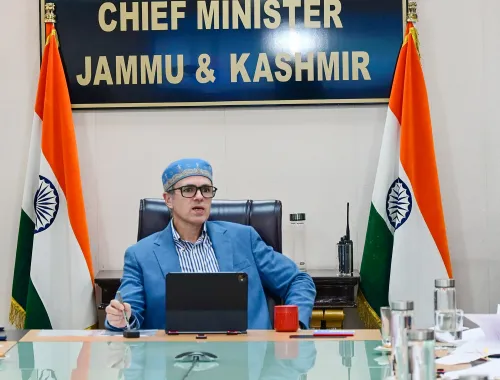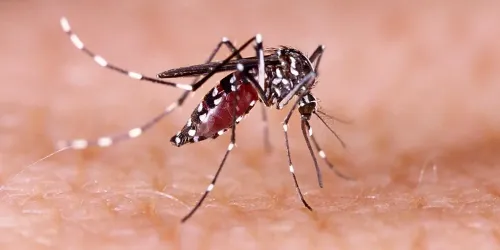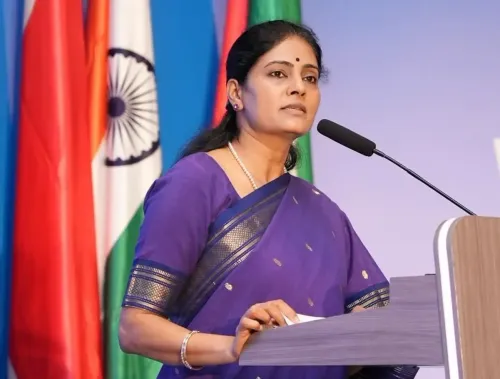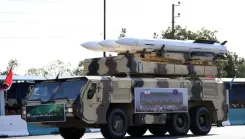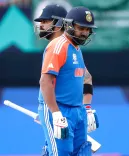Is India Among the Top Five Countries with Its Own Domestic 4G Stack?
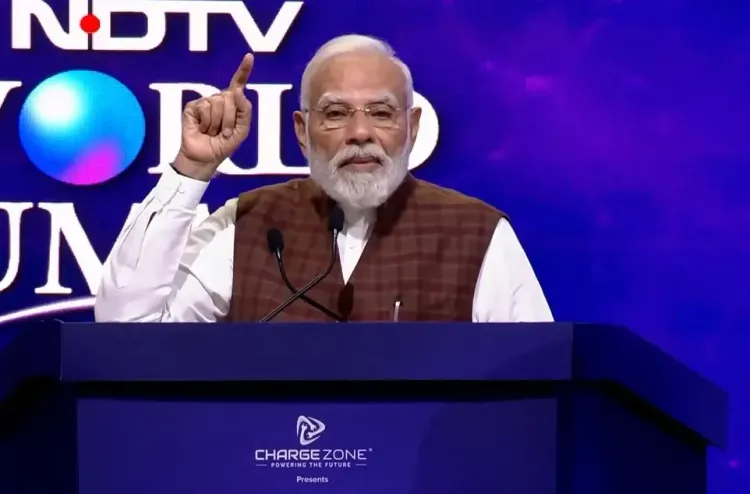
Synopsis
Key Takeaways
- India's Transformation: From the 'Fragile Five' to a top global economy.
- Resilience: India has continuously disproved doubts regarding its growth.
- Technological Advancements: Launch of an indigenously developed 4G stack.
- Poverty Alleviation: 25 crore citizens lifted out of poverty in the last eleven years.
- Global Partnerships: Significant investments from European nations and tech giants.
New Delhi, Oct 17 (NationPress) Prime Minister Narendra Modi addressed the NDTV World Summit 2025 held in New Delhi on Friday. He warmly welcomed the esteemed assembly of global leaders and set a positive tone for the summit. In his speech, PM Modi highlighted India’s unwavering progress and its position as a beacon of hope in a swiftly changing world.
Wishing everyone a joyful Diwali, PM Modi acknowledged that the NDTV World Summit coincides with the festive season. He praised the session's theme—“Unstoppable India”—and remarked that it is indeed fitting, as India is currently in no mood to slow down. The Prime Minister asserted, “India will neither stop nor pause; 140 crore Indians are moving forward rapidly, together.”
He pointed out that in a world facing various hurdles, the discussion around an “Unstoppable India” is both timely and necessary. PM Modi placed this theme in the context of the state of affairs eleven years ago compared to now.
Reflecting on the pre-2014 era, he highlighted the concerns that dominated discussions at such summits. Issues included how India would navigate global challenges, exit the “Fragile Five” group, and when the era of large-scale corruption would conclude.
PM Modi recalled that prior to 2014, there were widespread fears regarding women’s safety and the unchecked rise of terrorist sleeper cells. He noted that songs lamenting inflation, like “Mehangai Dayan Khaye Jaat Hai,” were often heard.
At that juncture, both citizens and the international community perceived India, ensnared in various crises, as incapable of recovery. The Prime Minister stated that in the past eleven years, India has dispelled every doubt and triumphed over each challenge. He emphasized that India has evolved from being part of the “Fragile Five” to one of the top five global economies, with inflation now below two percent and a growth rate exceeding seven percent.
“From chips to ships, the confidence of an Atmanirbhar Bharat is palpable across sectors,” noted the Prime Minister, stressing that India no longer remains passive after terrorist attacks; it responds decisively through surgical strikes, air strikes, and operations like Sindoor.
PM Modi urged attendees to remember the COVID-19 period, when the world was under the shadow of a health crisis. He pointed out that there was rampant speculation about how a nation with such a large population would survive such a monumental challenge.
He stated that India proved all speculations wrong, confronting the crisis head-on, swiftly developing its own vaccines, administering them in record time, and emerging as the fastest-growing major economy.
As the effects of COVID-19 started to fade, conflicts began to arise globally, leading to renewed questions about India's growth prospects.
Yet again, PM Modi affirmed that India disproved all doubts and continued to progress as the fastest-growing major economy. Over the past three years, India’s average growth rate has been an unprecedented 7.8 percent. He shared that recent merchandise export data revealed nearly a 7 percent increase compared to the previous year.
Last year, India's agricultural exports reached approximately ₹4.5 lakh crore. Amidst fluctuating ratings in various countries, S&P upgraded India’s credit rating after 17 years. The IMF has also revised India’s growth outlook upward.
He pointed out that just a few days ago, Google announced a significant investment of $15 billion in India's AI sector. Additionally, substantial investments are being made in green energy and semiconductor sectors.
“India’s growth today is creating global opportunities,” exclaimed PM Modi, citing the recent EFTA Trade Agreement as a significant example, under which European nations have committed to invest $100 billion in India.
This, he noted, will result in extensive job creation. Referring to the recent visit of the UK Prime Minister and his close associate, H.E. Mr. Keir Starmer, who came with the largest-ever business delegation, PM Modi remarked that this demonstrates the scale of opportunities the world perceives in India. India's trade with G-7 countries has surged over sixty percent.
“The world now regards India as a reliable, responsible, and resilient partner,” affirmed PM Modi, indicating that investment is flowing into India across various sectors, from electronics to pharmaceuticals, and from automobiles to mobile manufacturing. He emphasized that these investments are establishing India as a nerve center of the global supply chain.
While the summit topic “Edge of the Unknown” may symbolize uncertainty for the world, PM Modi stated that for India, it represents a gateway to opportunities. He stressed that India has, for centuries, demonstrated the courage to explore unknown paths. Saints, scientists, and navigators have shown that the “first step” marks the commencement of transformation.
In sectors like technology, vaccine development during the pandemic, skilled labor, fintech, or green energy, India has transformed every risk into reform, every reform into resilience, and every resilience into revolution. The Prime Minister referred to recent remarks from the IMF Chief, who expressed great enthusiasm regarding India's bold reforms.
He shared an instance where global consensus doubted the feasibility of delivering digital identity on a mass scale; however, India proved them wrong. Currently, fifty percent of the world’s real-time digital transactions occur in India, and India’s UPI is dominating global digital payment systems.
PM Modi underscored that exceeding every prediction and assessment has become a defining trait of India—and that is why India is unstoppable.
“The true strength behind India’s achievements arises from its people,” emphasized PM Modi, stating that citizens can realize their full potential only when the government refrains from imposing pressures or intervening in their lives. He noted that excessive government control acts as a brake, whereas increased democratization propels progress.
The Prime Minister criticized the opposition party, which governed for sixty years, for consistently promoting bureaucratization of policy and process. In contrast, he highlighted that over the past eleven years, his government has concentrated on democratizing both policy and process—an essential factor behind the rise of an unstoppable India.
Citing the banking sector as an example, PM Modi recalled that in the 1960s, the then Prime Minister justified nationalizing banks by claiming it would extend banking services to the poor, farmers, and laborers. However, he asserted that in reality, the then-ruling party distanced banks from the people to the extent that the poor feared even approaching bank doors.
As a result, he stated, in 2014, more than half of India’s population lacked a bank account. PM Modi clarified that this was not merely a lack of accounts; it meant that a significant portion of the population was deprived of banking benefits and forced to borrow at high-interest rates from the market, often pledging their homes and land.
He emphasized the need to liberate the country from excessive bureaucratization, which his government has successfully achieved, spotlighting the democratization and reform of the banking sector, including the opening of over 50 crore Jan Dhan accounts in mission mode. Today, every village in India has at least one banking access point.
PM Modi stated that digital transactions have positioned India as one of the globe's most financially inclusive nations. He criticized the opposition-led nationalization for creating a mountain of NPAs in banks and remarked that his government’s democratization efforts have led to record profitability for banks. Over the past eleven years, loans worth lakhs of crores have been extended without bank guarantees to women self-help groups, small farmers, livestock rearers, fishermen, street vendors, and Vishwakarma partners.
The Prime Minister cited the petroleum and gas sector as another example of transformation. He recounted that before 2014, under the bureaucratic mindset, the opposition government was preparing to restrict petrol pump operations from 8 PM to 8 AM to avoid increasing fuel subsidies.
In contrast, he highlighted the current scenario where petrol pumps operate 24/7 without restrictions. The Prime Minister underscored that India is now making unprecedented investments in alternative fuels and electric mobility.
Highlighting that during the opposition era, even obtaining a gas connection required recommendation letters from Members of Parliament, PM Modi illustrated the extent of bureaucratization in the system. In contrast, he stated that his government has provided free gas connections to over 10 crore poor families—many of whom never envisioned access to such facilities. He affirmed that this exemplifies true democratization of governance.
PM Modi remarked that during the era dominated by bureaucratic thinking, the opposition allowed public sector undertakings (PSUs) to stagnate, metaphorically locking them up and resting easy. He criticized the mindset that questioned the necessity of effort, assuming it bore no personal cost. The Prime Minister stated that his government altered this approach. Today, major PSUs like LIC and SBI are achieving new records in profitability.
He emphasized that when government policies prioritize democratization over bureaucratization, citizen morale rises. He criticized the opposition party for repeatedly chanting “Garibi Hatao” without delivering results, asserting that poverty did not decline under their governance. In contrast, he pointed out that his government’s democratized approach has lifted 25 crore poor citizens out of poverty over the past eleven years. This, he stated, is why the nation places its trust in the current government and why India is unstoppable today.
PM Modi affirmed that India now has a government devoted to serving the poor and the marginalized, prioritizing backward communities and working sensitively to enhance their lives. He noted that such efforts often go unnoticed in significant discussions.
As an example, he cited the recent launch of BSNL’s Made-in-India 4G stack, calling it a significant national milestone. He proudly stated that India is now among the top five nations globally with an indigenous 4G stack. The Prime Minister noted that BSNL, a public sector entity once overlooked by the opposition, is now achieving new heights. He added that the launch of the 4G stack was accompanied by BSNL activating nearly one lakh 4G mobile towers on the same day.
Consequently, millions residing in remote forests and hilly areas—previously lacking high-speed internet—are now benefitting from fast internet services.
Highlighting a remarkable aspect of India’s success that often goes unnoticed, PM Modi asserted that when advanced facilities reach remote areas, they transform lives. Citing the example of e-Sanjeevani, he illustrated how a family in a distant hilly area, unable to transport a sick member to a doctor due to adverse weather, can now access medical consultations through the high-speed connectivity-based e-Sanjeevani service.
PM Modi explained further that through the e-Sanjeevani app, patients in remote regions can connect directly with specialist doctors via their phones. He informed that over 42 crore OPD consultations have already been facilitated through e-Sanjeevani.
On the very day of his address, PM Modi stated that more than one lakh people across the country had received assistance through the platform. He emphasized that e-Sanjeevani is not just a service—it is a symbol of trust that help will be available in times of crisis. He described it as a powerful example of the transformative impact of democratizing public systems.
PM Modi underscored that a sensitive government, committed to democracy and the Constitution, formulates policies that prioritize ease of living and financial savings for citizens.
He highlighted that before 2014, 1 GB of data cost ₹300, but now it costs only ₹10, resulting in annual savings of thousands of rupees for every Indian. Through the Ayushman Bharat scheme, the Prime Minister noted that poor patients have saved ₹1.25 lakh crore. Medicines at PM Jan Aushadhi Kendras are available at an 80 percent discount, leading to savings of approximately ₹40,000 crore. Additionally, reduced prices of heart stents have enabled annual savings of ₹12,000 crore for low and middle-income families.
Emphasizing that honest taxpayers have directly benefited from his government’s reforms, the Prime Minister noted significant reductions in both income tax and GST, stating that this year, income up to ₹12 lakh has been made tax-free.
He mentioned that the GST Bachat Utsav is currently in full swing, and recent sales have shattered all previous records. The Prime Minister affirmed that these measures—on income tax and GST—are set to yield annual savings of approximately ₹2.5 lakh crore for Indian citizens.
PM Modi acknowledged the widespread national and international acclaim for Operation Sindoor. He then shifted focus to another pressing issue—Naxalism and Maoist terrorism—which he characterized as not only a significant security concern but also closely tied to the future of India’s youth.
He stated that during opposition rule, the ecosystem of Urban Naxals had become so entrenched that the rest of the country remained largely unaware of the scope of Maoist terrorism. While terrorism and Article 370 were widely debated, PM Modi said that Urban Naxals occupied key positions and actively worked to suppress discussions about Maoist violence. He noted that even recently, several victims of Maoist terrorism came to Delhi, yet the opposition ecosystem ensured that their plight received minimal attention.
The Prime Minister described the serious situation that once prevailed across nearly every major Indian state, where Naxalite and Maoist violence had deeply rooted itself. He stated that while the Constitution was operational across the nation, in the Red Corridor, there was no one to even invoke its name. Governments were elected, but in those regions, they held no real authority. The Prime Minister recounted how, after nightfall, venturing outside became dangerous, and even those tasked with providing public security had to do so under protection.
Highlighting the devastating effects of Maoist terrorism over the last 50–55 years, he noted that thousands of lives were lost, including many security personnel and young citizens, while Naxalites obstructed the construction of schools and hospitals, even bombing existing facilities. Consequently, a vast region of the country and a large segment of the population remained deprived of development for decades.
PM Modi underscored that this prolonged neglect disproportionately affected tribal communities and Dalit brothers and sisters, who bore the brunt of this violence and underdevelopment.
“Maoist terrorism is a great injustice and a grave sin against the nation's youth,” remarked the Prime Minister, affirming that he could not allow young citizens to remain ensnared in such circumstances.
Therefore, since 2014, his government has worked sensitively to reintegrate misguided youth into the mainstream. The Prime Minister highlighted the results of these endeavors: while 11 years ago, over 125 districts were affected by Maoist violence, today that number has dwindled to just 11 districts, of which only three remain significantly affected by Naxalism.
PM Modi mentioned that over the past decade, thousands of Naxalites have surrendered, sharing a recent statistic from the last 75 hours, during which 303 Naxalites laid down their arms and surrendered. He added that these were not ordinary insurgents—some had bounties of ₹1 crore, ₹15 lakh, or ₹5 lakh, and a significant cache of weapons was also recovered from them.
The Prime Minister assured that these individuals are now returning to the path of development and openly acknowledging that they were on the wrong path. He emphasized that they now move forward with faith in the Constitution of India.
Reflecting on how headlines once routinely reported incidents from Bastar, Chhattisgarh—then recognized as a stronghold of Naxalism—he highlighted the transformation, noting that today, tribal youth in Bastar are organizing the Bastar Olympics, symbolizing peace and progress.
He stated that this Diwali, regions liberated from Maoist terrorism will celebrate with renewed joy, lighting lamps of happiness. PM Modi assured the people of India that the day is not far when India will be entirely free from Naxalism and Maoist violence, adding that it is a guarantee of their government.
“India’s journey toward becoming a developed nation is not merely a pursuit of growth; development must walk hand in hand with dignity, where speed is complemented by respect for citizens, and innovation must aim not only for efficiency but also for empathy and compassion. India is advancing with this very mindset,” remarked the Prime Minister. He concluded by acknowledging the significant role of platforms like the NDTV World Summit in furthering this vision and expressed gratitude for the opportunity to present the nation’s perspective, extending his best wishes to all participants of the event.

